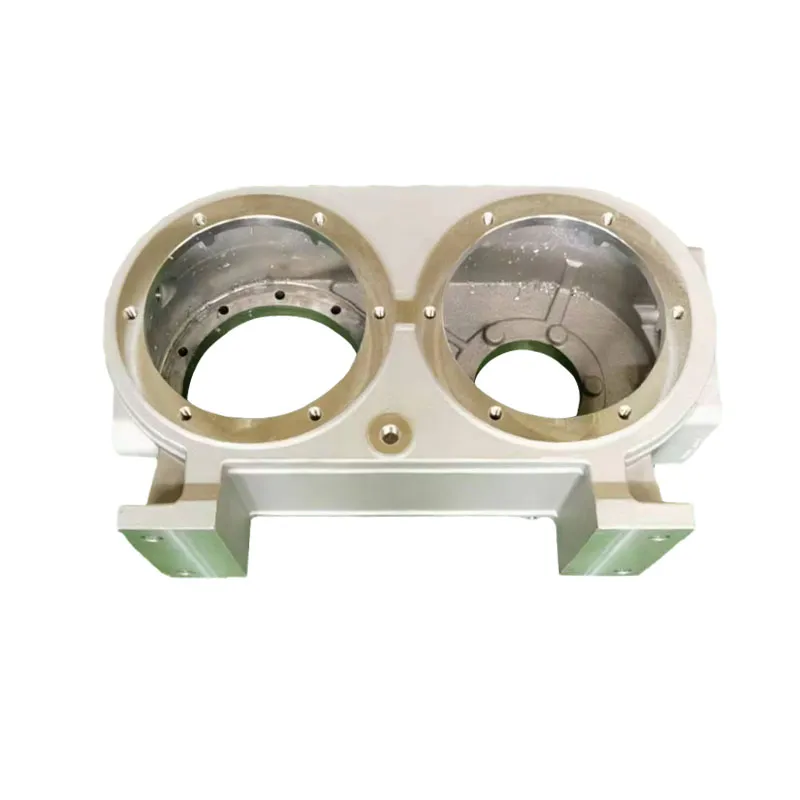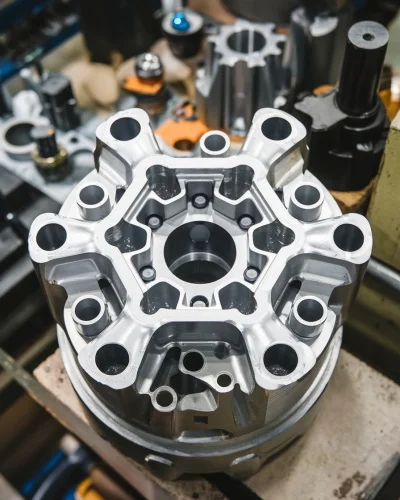The Future of Light Weight Aluminum Foundries: Advancements and fads Shaping the Sector
The aluminum shop industry is undertaking considerable makeover. Key patterns highlight the relevance of sustainability and efficiency. Developments in wise production and automation are ending up being widespread. Shops are increasingly concentrated on utilizing recycled products. This shift questions about future practices and innovations. Just how will these adjustments impact production techniques and market dynamics? The responses might redefine the sector landscape in unforeseen means.
Innovations in Smart Production Technologies
As the aluminum foundry market progresses, advancements in smart manufacturing modern technologies are ending up being significantly crucial for enhancing productivity and performance. The integration of automation, expert system, and the Internet of Things (IoT) is transforming typical foundry procedures. These technologies enable real-time surveillance of procedures, permitting instant changes that optimize output and lower waste.
Machine knowing algorithms analyze production data to determine patterns and predict upkeep needs, decreasing downtime. Robotics are significantly employed for recurring tasks, freeing experienced workers to concentrate on even more complicated difficulties. In addition, electronic doubles-- online versions of physical processes-- help with simulations that can improve design and functional methods.
The adoption of these smart production innovations is driving affordable advantages in the aluminum foundry field. By simplifying workflows and improving decision-making abilities, foundries can satisfy expanding market needs while preserving top notch standards. The future of light weight aluminum foundries is undeniably connected to these technical innovations.
Accepting Eco-Friendly Products and Processes
The aluminum shop industry is increasingly focusing on eco-friendly materials and procedures to enhance sustainability. This shift includes the adoption of sustainable product sourcing, energy-efficient manufacturing techniques, and effective recycling and waste management techniques. By integrating these techniques, foundries aim to lower their environmental effect while keeping competition out there.
Lasting Product Sourcing
Just how can aluminum factories boost their sustainability efforts? Sustainable product sourcing has become an important technique in attaining this objective. By prioritizing recycled aluminum, factories can considerably lower their environmental footprint, as recycled materials call for much less energy and fewer resources compared to primary aluminum production. Furthermore, sourcing products from licensed suppliers who adhere to environment-friendly methods promotes liable mining and decreases environmental influence. Shops are likewise checking out alternative materials, such as biopolymers and eco-friendly coverings, to complement typical light weight aluminum processes. Collaborating with stakeholders, consisting of vendors and ecological companies, promotes innovation in sourcing strategies. Inevitably, welcoming lasting material sourcing not only aligns with global sustainability objectives yet likewise positions light weight aluminum shops as leaders in eco accountable manufacturing.
Energy-Efficient Manufacturing Techniques
Aluminum foundries are increasingly taking on energy-efficient manufacturing methods to complement their lasting product sourcing efforts. These methods concentrate on minimizing power intake throughout the manufacturing procedure. Advanced innovations, such as induction melting and optimized spreading processes, are being implemented to reduce the total carbon footprint. In addition, automation and wise manufacturing systems improve functional performance, enabling for far better energy monitoring. Factories are additionally checking out the assimilation of renewable resource sources, such as solar and wind, to power their procedures. By prioritizing power efficiency, light weight aluminum factories not just lower manufacturing expenses but also align themselves with international sustainability objectives, making sure a more environmentally accountable method to aluminum production while fulfilling the increasing demand for environment-friendly techniques in the industry.
Reusing and Waste Administration
Embracing environmentally friendly materials and processes, aluminum foundries are focusing on recycling and waste management techniques to improve sustainability in their procedures. By integrating closed-loop systems, these facilities are lessening waste and making best use of resource efficiency. Scrap aluminum, a conveniently offered product, is being reused on-site, substantially reducing the need for virgin products and decreasing energy usage. Advancements in sorting and refining modern technologies further facilitate the recycling of aluminum, ensuring that even contaminated materials can be repurposed efficiently. Furthermore, factories are taking on lasting methods such as minimizing contaminated materials and promoting the use of naturally degradable materials for packaging. This dedication to reusing not only decreases ecological effect however also boosts the economic viability of aluminum shops in an open market.
The Function of Automation and Robotics
Automation and robotics are significantly transforming the aluminum shop sector, substantially improving production performance. By integrating innovative innovations, foundries can minimize labor costs while simultaneously enhancing safety criteria for their workforce. This change not just enhances operations yet likewise positions the market for sustainable growth in an open market.
Enhanced Manufacturing Effectiveness
Revolutionizing manufacturing processes, the integration of sophisticated robotics and automation innovations has become a keystone for aluminum foundries seeking boosted performance. These technologies improve workflows, lower cycle times, and boost item high quality by reducing human error. Automated systems can keep track of production lines in real-time, permitting prompt changes that optimize result. check these guys out Additionally, robotics assist in the handling of hazardous materials, guaranteeing more secure workplace while increasing throughput. Anticipating upkeep technologies likewise add to performance by anticipating devices failings, thus minimizing downtime. As a result, aluminum shops can attain higher uniformity in their products while responding much more quickly to market needs. This embrace of automation is setting a brand-new criterion for productivity and operational excellence within the market.

Minimizing Labor Expenses
The shift in the direction of progressed robotics and automation in light weight aluminum factories not only boosts production effectiveness however likewise plays a considerable role in decreasing labor costs. By integrating automated systems, factories can reduce the reliance on manual work, which often entails high incomes and training costs. Robotics improve repetitive tasks such as pouring, molding, and ending up, permitting a higher result with fewer workers. This technological modification not just minimizes labor-related costs yet likewise improves uniformity and quality in manufacturing. Additionally, automation can operate all the time, taking full advantage of operational hours without the connected costs of overtime or shift differentials. As an outcome, aluminum factories can accomplish considerable savings while keeping competitive pricing in an evolving market landscape.
Improving Safety And Security Specifications
While conventional aluminum factory operations find more information often reveal workers to unsafe atmospheres, the integration of robotics and automation greatly improves safety standards within the sector. Automated systems can perform high-risk jobs, such as molten metal handling and hefty lifting, decreasing human exposure to hazardous problems. Additionally, robotics can operate in poisonous environments and severe temperatures, properly reducing the threat of injury. Advanced monitoring innovations and expert system assurance real-time safety and security evaluations, permitting immediate feedbacks to potential dangers. Automation streamlines workflows, lowering the possibility of accidents caused by human error. As an outcome, the adoption of these innovations not just boosts safety but additionally fosters a more efficient and efficient workplace in aluminum shops.
Enhancing Energy Efficiency in Manufacturing
As light weight aluminum foundries seek to keep competitiveness in a progressing market, improving energy efficiency in manufacturing has actually become an important emphasis. By adopting advanced technologies such as high-efficiency melting heaters and automated temperature level controls, factories can notably reduce power consumption. Executing real-time tracking systems permits for exact monitoring of energy usage throughout the manufacturing process, allowing quick changes to enhance efficiency.
In addition, moving to alternative energy resources, consisting of renewable choices, can additionally reduce the carbon impact. The integration of power healing systems, which redeem waste warm for reuse, is becoming significantly common. Educating personnel in energy monitoring practices assures that everyone associated with the manufacturing process bears in mind power usage.
These initiatives not only lower operational expenses yet also straighten with global sustainability goals, positioning light weight aluminum foundries as accountable gamers in the industry while improving their total competitiveness. - Precision aluminum casting
Developments in Recycling Aluminum
Technologies in recycling aluminum have actually obtained momentum together with initiatives to boost energy efficiency in production. The aluminum sector has embraced sophisticated innovations that simplify the reusing process, decreasing energy usage and environmental effect. Strategies such as hydrometallurgy and brand-new sorting innovations boost the removal of light weight aluminum from scrap, boosting return prices and ensuring higher quality recycled material.
The development of closed-loop recycling systems enables foundries to reuse light weight aluminum without substantial degradation in quality, making the procedure more lasting. Developments in logistics and collection, including enhanced tracking systems and automated sorting, have additionally played an essential duty in enhancing the efficiency of light weight aluminum recuperation. These innovations not just contribute to a circular a knockout post economy but additionally aid minimize the carbon footprint connected with light weight aluminum production. As the need for sustainable methods expands, these technologies place the aluminum foundry market as a leader in accountable resource monitoring.
Reacting To Market Demands and Consumer Trends
Adaptability has actually ended up being a cornerstone for light weight aluminum foundries reacting to developing market needs and consumer fads. As industries significantly focus on sustainability, light weight aluminum shops are changing towards environment-friendly methods, consisting of improved reusing procedures and decreased carbon impacts. This change lines up with customer preferences for ecologically accountable products, driving shops to innovate their offerings.
Furthermore, the surge of lightweight materials in auto and aerospace fields necessitates innovations in aluminum alloys and casting methods. Shops are purchasing research study and growth to produce high-strength, lightweight parts that meet rigid efficiency criteria.
Modification has gotten grip, with customers seeking tailored services. Aluminum factories are leveraging innovative manufacturing innovations, such as 3D printing, to fit certain customer needs successfully. This responsiveness not just satisfies consumer needs but also settings aluminum factories competitively in a dynamic market landscape, ensuring their relevance in an ever-changing industrial environment.

Regularly Asked Concerns
Exactly How Do Aluminum Foundries Impact Local Economies?
Light weight aluminum shops significantly influence regional economies by developing tasks, boosting demand for local providers, and adding to neighborhood advancement. Their procedures often lead to enhanced tax obligation incomes, which can fund necessary public services and infrastructure enhancements.
What Are the Safety Laws for Aluminum Foundry Workers?
Safety laws for light weight aluminum foundry employees include required personal safety equipment, proper ventilation systems, normal training on unsafe products, and adherence to standards established by work-related health and wellness managements to decrease threats and guarantee employee safety. - Precision aluminum casting
Just How Does Light Weight Aluminum Recycling Affect Global Supply Chains?
Aluminum reusing substantially decreases need for raw products, enhances resource performance, and stabilizes costs. This change influences international supply chains by promoting a round economic climate, advertising sustainability, and making sure a more durable sector in varying markets.
What Job Opportunities Exist in the Aluminum Factory Market?
Numerous career chances exist in the light weight aluminum foundry sector, consisting of roles in engineering, high quality control, production administration, and research study and advancement. Skilled labor positions such as mold makers and device operators are also popular.
How Do International Trade Policies Impact Light Weight Aluminum Foundries?
International profession policies significantly affect light weight aluminum shops by influencing import tolls, supply chain characteristics, and market access. These factors can affect operational prices, competitiveness, and total profitability within the global aluminum manufacturing landscape.
By focusing on recycled light weight aluminum, factories can considerably decrease their environmental footprint, as recycled materials call for much less energy and fewer sources contrasted to primary aluminum manufacturing. Light weight aluminum shops are progressively embracing energy-efficient production strategies to match their sustainable material sourcing campaigns. Automation and robotics are progressively transforming the light weight aluminum foundry industry, considerably enhancing manufacturing performance. The shift towards progressed robotics and automation in light weight aluminum factories not only boosts production effectiveness however also plays a significant duty in lowering labor expenses. As aluminum shops look for to preserve competitiveness in an advancing market, boosting energy efficiency in manufacturing has emerged as a vital emphasis.